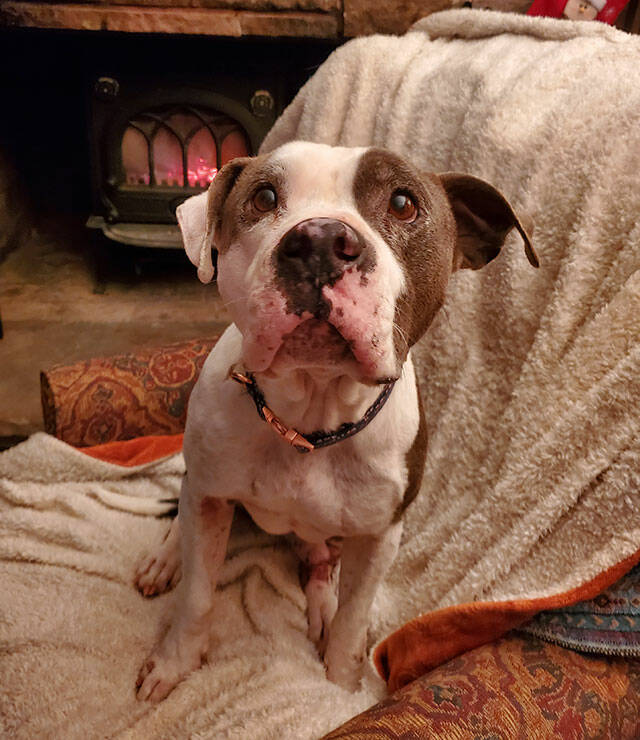Fans of Star Trek will be familiar with the Vulcan “mind-meld” — the enigmatic Mr. Spock would place his hands on someone’s head and use this mysterious technique to read the history, thoughts and emotions therein.
Anyone who has ever adopted a rescue dog has probably wished they had Spock’s mind-reading abilities, as much of the time we have no idea as to the details of a dog’s life prior to his rescue. Wounds, body condition or behavior offer hints, clues that sometimes suggest neglect or abuse. But for the most part, a stray dog’s past is forever a mystery.
So it is with Petey, a pitbull we’re currently fostering. Picked up on a street in San Bernadino last year, he’s maybe eight or nine years old and on the small side for his breed, a scant 40-odd pounds. He has a square block of a head, pretty gray and white coloring, soulful brown eyes, and a nose that’s often a cute flushed pink.
Petey was rescued from a high-kill animal shelter in August; and then, because the rescue organization had no other options, he was placed in a boarding kennel for several months until my wife and I saw his photo on the internet and were sufficiently moved by his plight to offer to foster him. We hated the idea of a harder-to-adopt older dog languishing in a kennel.
He arrived three days before Christmas, part of a veritable menagerie. In a parking lot in Tacoma, a large van disgorged a chaotic mass of pent-up canine energy; there were dogs of various shapes and sizes, surrounded by folks like us who’d come to meet the critters we’d all agreed to take in. And there, among the crowd, was Petey: dusty, tired and a little skinny, but wagging his tail and seemingly completely fine with being bundled into a car and driven away by total strangers.
He integrated himself into our household very quickly, happy to accept his position in a domestic hierarchy that currently involves a German shepherd and a Staffordshire terrier (the latter having made it quite clear from the outset where her two housemates sit in that pecking order).
Like every pitbull we’ve ever known, Petey loves his comfort: he spends much of his day in an armchair by the fire, and he likes it when we cover him with a blanket. Being a California dog originally, he wasn’t wildly enthusiastic about the recent bout of snow, but he enjoys all the wonderful smells to be savored in the rural and woodland environment of Vashon, so very different from his experience on city streets.
I’m sure Petey was in a home of some sort in his life — after all, at his age, he had to have been somewhere before he was picked up. But whatever his past situation, it’s pretty clear that no one ever took the time to really care for him or train him, let alone show him how to be a valued member of a family. When he arrived, he was completely clueless about any commands — even attempts to get him to “sit” were met with a blank look (albeit one intently focused on the treat being offered). He was house-trained (thank heaven), but that was about it.
People comment that Petey always looks sad in his photos, and certainly, this brave little dog has had plenty of reasons in his life to be so; but amazingly, he’s not. He constantly wags his tail, gets along with dogs and humans alike, and is slowly opening up to us. He’s grateful for every touch and hug, but he seems surprised by affection; and until the other day he’d never really sought that contact.
Then on New Year’s, just after midnight, I was sitting on the couch with my wife, when Petey climbed up and arranged himself between us. He looked up at me, then laid his head on my lap, closed his eyes, sighed at the touch of my hand on his neck, and went to sleep. It was the first time he’d done this, and this small, poignant gesture moved me almost to tears – for here was a dog who has had a hard life, wanting to trust humans again. My wife and I looked at each other across the small space of Petey’s sleeping form and smiled as we felt the tremendous power of that silent choice.
These days, with the world in disarray, it’s often increasingly difficult to be optimistic about things. Climate change, autocracy, war, famine and widespread tribalistic hatred – one feels, helplessly, that there is very little one can do about these vast, chaotic currents of history-in-the-making swirling all around us. Increasingly, many of us are turning away from global events and trying instead to focus on small acts and small kindnesses at the local level. Yet there are days when it’s hard not to give in to despair.
But sometimes, in the moment, it’s simpler than that. Sometimes hope is just a pit bull with his head on your lap, an old dog learning for the first time what it’s like to be loved.
Phil Clapham is a retired whale biologist who lives on Maury Island. And Petey is available for adoption; go to vipp.org for details.



